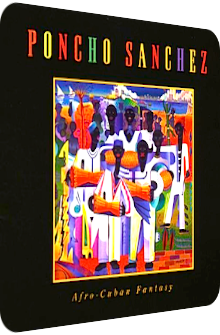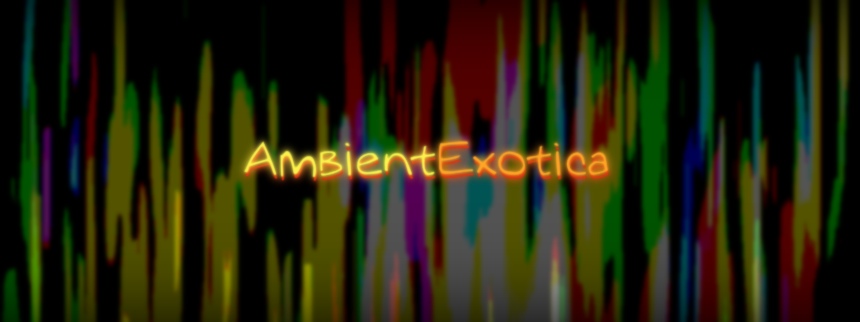
Poncho Sanchez
Afro-Cuban Fantasy
1998
Afro-Cuban Fantasy by conguero and vocalist Poncho Sanchez is an accessible and most importantly vintage-oid piece of modern Latin music with huge amounts of tropical rhizomes to capture the imagination and grab the attention of the Exotica fan who strongly prefers the golden 50’s and 60’s where the genre was spawned, worshipped and ultimately turned down. But let us not focus on this negative side, for Exotica is thankfully resurrected and stronger than ever. Released in 1998 on Sanchez’s house label Concord Jazz, spanning twelve tracks as played by an octet, with many of these compositions being unique cuts, Afro-Cuban Fantasy does not hide its two primary columns: fantasies the listener shall receive, and no surprise, these should be delivered in an Afro-Cuban style.
While this is indeed the case, the timbre, joy and many positive overtones are bursting at the seams, for they are covered with bliss and rapture. Dreamy takes are as prominently featured as blooming Exotica originals and high-energy cityscapes, one of them brought to life with the help of a field recording in a subway station, just to make sure that the listener catches the band’s drift. Speaking of the band: said octet comprises of percussionist-conguero Poncho Sanchez at the helm, Ramon Banda on the timbales, pianist-songwriter David Torres who offers many original songs, Tony Banda on the bass, José “Papo” Rodriguez on the bongos as well as the brass players Sal Cracchiolo, Scott Martin and Francisco Torres. Here comes a modern album reminiscing the good old times, be it through interpretations of classics or that certain spirit reaching into new tunes.
Pianist David Torres is all over this album, not only literally so by showcasing prestidigitation on his signature instrument, but also due to his writing skills which appear regularly. The opener sees him team up with Poncho Sanchez: Ritmo Remo seems to be one of those fiery Latin screamers as Scott Martin’s saxophone meets Sal Cracchiolo’s trumpet in a piercing way. The short prelude, however, leads to what Exotica fans like to call a pool scenery, with sun-dappled piano chords, Ramon Banda’s timbales which taste like the Caribbean ocean, Poncho Sanchez’s high-plasticity conga capsules and the final touch of José Rodriguez’s aqueous bongo bubbles. This is Latin laissez-faire, an insouciant six-minute pipe dream, by no means superfluous, but all the more superfluid.
Morning, meanwhile, is a cautiously urbanized piece of Tropicana as envisioned by Douglas Clare Fischer, showcasing Dianne Reeves’ silkened vocals, piano-horn bursts that are equally veiled, evoking the morning haze of a bustling cityscape, and last but not least, magnificently erupting drums plus sizzling hi-hats. Shawm-like snake charmer melodies on the trumpet prove to be the weirdly twisted counterpart to the otherwise mellow aura. Even interim rhythm shifts are unfolding freely. Catchy, Latin, metropolitan and exotic. David Torres’ own Subway Harry follows and is introduced with a fitting field recording as the sub comes to a screeching halt. The subtheme of urbanization remains a strong force. Handclaps, slickly glowing horns and golden piano splinters encapsulate the stroll through a South American city. Quirky chants and shouts fit in splendidly, although the exoticism that is sewn into this album, remains amiss in this particular track.
A Trinidadian taste of turmoil is unleashed with Guapacha, a strikingly festive vision supercharged with reverberated vocals, coruscating timbales, piano prongs and Scott Martin’s warbling flute. The morphogenesis of this postmodern public domain artifact is nonetheless 100% Latin, and no, there aren’t any steelpans on board. The Latin factor is exchanged and annihilated during Darn That Dream, written by Eddie DeLange and James Van Heusen. Featuring the moony voice of Dianne Reeves for the second of three times, this is the nocturnal Lounge theme of the album, soothing and balmy, nice and slow, with the moonlit saxophones, decelerated conga underlinings and rhythmic piano structures providing the enthralling backdrop for Reeves in the spotlight. A reverie by the numbers, but greatly ameliorated by the punch and decay of the congas.
David Torres’ own Sambroso luckily ventures into the – admittedly artificial – world of consumerism once more by providing the Samba-influenced uplifting vibe of an insouciantly glitzy resort by means of helicoidal horns, refreshingly vitreous timbales, cowbells and many drums as well as euphonious piano undercurrents. This is Latin alright, but mercilessly close to the paradisiac elation of Exotica. The following Jazz classic prolongs this beautiful vista, for it is time for Ann Ronell’s Willow Weep For Me, a tune which appears in a Space-Age context more often than not. The octet transmutes this classic into a Latin piece of hypnotizing mesmerization; polyphonous flute-and-reed pairings play the lead melody, everything is sylphlike and awash with light, making this rendition surprisingly accessible by carving out the magic of the melody in lieu of unchaining a cavalcade of gimmicks.
The centerpiece of the album is the eponymous Afro-Cuban Fantasy. Running for almost seven minutes, David Torres’ offering is a polyvalent sparkler whose thrill is hard to explain. The song is undoubtedly stable and does not feature Third Stream segues or something in that vein, but still manages to graft the endemic shangri-la strata onto the equally intrinsic aura of the big city life. The horns are aglow but never explode in a piercing way. The conga coppice diffuses a vintage verdure, the timbale staccato is crystalline as ever, with the polyphony making even the percussion-driven sections melodious and feisty. David Torres returns for the very last time by teaming up with Poncho Sanchez on Ven Pa Bailar. Sanchez’s husky voice and the timbale-driven saxophone undulation are oscillating more toward truthful Latin climes, but the instrumental take on Close Your Eyes, originally conceptualized by Bernice Petkere, replaces the vocals with Scott Martin’s tenor saxophone and provides another midnight mélange coated in a dreamy allure.
Clare Fischer’s I Remember Spring celebrates the return of Dianne Reeves one more time as her heavily reverberated voice augments the feeling of sitting in an aural antrum of wonder. The scheme itself is not so surprising anymore, as it is time for another streamlined, soft affair. What an antagonist Playboy’s Theme turns out to be in this regard! Cy Coleman’s Jazz standard catapults the listener into a sternly ebullient, vesiculating Latin city. The asphalt is melting, the horns tear down the walls… and the exotic vintage flavor. Hey, that’s what playboys do, tearing down things and other stuff, right?
Afro-Cuban Fantasy is not too bold a title in many regards, as two interpretations of the term fantasy are graspable throughout the runtime and open to scrutiny even when the album has reached its, hopefully momentary, endpoint. The fantastic – as in: fantasy-related – aspects are twofold and different enough to cater to certain audiences of the heterogenous Exotica crowd. There is that certain dreaminess on the one hand, the many plateaus of romance, magic and even contemplation as shown on songs like Darn That Dream and Close Your Eyes which fittingly enough imply the element of fantasy in their title already. Then there is that other kind of fantasy, the one Exotica fans crave for: adventurous but completely harmless and all the more melodious sunscape pieces with diffractive light, luminescent cannelures and plastic-posh sceneries that become all the more surreal the more people search for them in reality.
Afro-Cuban Fantasy manages to catch these kinds of fantasies equally well, shuttling between vintage gardens, pool parties and city vignettes as if this were no big deal and every one of these instances were the same. Naturally, it is the songs and interpretations which are placed in these lively concrete jungles that are the harshest, most energetic ones. It is here where the timbales, cowbells and horns flash and glint, dazzling the listener qua their high sequences and sine tone-like clarity. But still, these archetypically Latin instances are still retrogressive enough to possibly enchant the fans of 50’s and 60’s music. Poncho Sanchez’s music is not about the congas. It is about the blending of their holy (or hollow) goodness with multitudinous textures. Afro-Cuban Fantasy is available on CD and in digital incarnations at iTunes, Amazon MP3 and cohorts.
Exotica Review 387: Poncho Sanchez – Afro-Cuban Fantasy (1998). Originally published on Nov. 8, 2014 at AmbientExotica.com.
